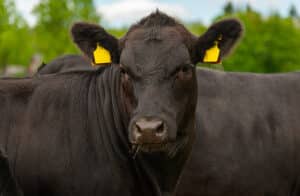15 Jun Improving welfare and performance in beef cattle: successful coping with heat stress.
By Mohamed Mammeri, PhD, Global Program Manager
 Heat stress continues to be a current global challenge accentuated by global warming. It contributes to major economic losses because of its negative impact on both animal’s welfare and performance. In the USA, there is an annual estimated loss of $897 million in beef cattle production.
Heat stress continues to be a current global challenge accentuated by global warming. It contributes to major economic losses because of its negative impact on both animal’s welfare and performance. In the USA, there is an annual estimated loss of $897 million in beef cattle production.
Heat stress negatively impacts beef cattle sector!
Cattle are homeotherms and they need to maintain their body temperature within a physiological range. Heat stress is primarily the result of elevated air temperature and can be intensified by high humidity, thermal radiation, and low air movement. As a result, animal physiology and behaviours are disturbed. Cattle hence suffer from heat stress with a negative impact on both welfare and performance.
Beef cattle welfare and performance are negatively impacted by heat stress:
1. rise of body temperature and discomfort,
2. reduction of weight gain and feed intake,
3. decrease of reproductive performance,
4. increase of morbidity and mortality.
New ways to beat the current heat stress challenge
Beef producers are seeking ways to alleviate some of the negative effects associated with heat stress. The first way is through shade and access/availability to water. Shade could be very useful, but this is a cost-effective investment. That’s why, within the U.S., there are few other options to alleviate heat stress; therefore, cattle feeders are looking for other viable options that may also enhance performance and health.
Nutritional solutions are known to alleviate the negative effects while improving the welfare and performance of so many animal species during heat stress conditions.
Phileo yeast solutions: improving beef heifers’ welfare & performance
A recent scientific trial was performed in USDA-ARS Bovine Immunology Research and Development Complex in New Deal (Texas, USA) involving 32 beef heifers (Broadway et al., 2020). This study aimed to evaluate the benefits of supplementing feedlots receiving beef heifers with the combination of the yeast probiotic Actisaf® Sc 47 and yeast postbiotic Safmannan® on their performance under moderate to severe heat stress conditions (peak of THI≈80).
Beef heifers were divided into 2 groups of 16 individuals each: a control group and a supplemented Actisaf® Sc 47 (1.5 g/h/d) and Safmannan® (2.5 g/h/d) group. Heifers had ad libitum access to fresh water (on-demand paddle water system).
After 50 d of supplementation, heifers were weighed, and their vaginal temperature was recorded during the study period. Heifers were allowed to acclimate to the facility for a 48-h period (d 1–2) in a thermoneutral (TN) climate (THI=67). On d 3–6, the THI of the building was gradually increased beginning at 08:00 h in a manner to reach a peak THI of 80 each day at 16:00 h. The THI was subsequently decreased beginning at 18:00 h in a manner to reach the minimum THI of 76 at 24:00 h. The THI pattern aimed to keep the heifers in the moderate to severe heat stress category that mimics environmental conditions often seen in summer months when temperatures do not decrease drastically after sunset.
Results confirmed that the combination of the yeast probiotic Actisaf® Sc 47 and the yeast postbiotic Safmannan®, can counteract some of the negative effects on performance and animal welfare during heat stress. Results have shown that yeast solutions reduced vaginal temperature (Figure 1), respiratory rate (-8%), and cortisol levels (stress hormone) (-9%), while water intake and frequency of drinking bouts were significantly increased by 15% and 25%, respectively. These results are important indicators of animal welfare, reflecting better thermoregulation and improved comfort which positively correlated with the improvement of body weight and performance (Figure 2).
This study demonstrated that the supplementation of heifers with the combination of the yeast probiotic Actisaf® Sc 47 and the yeast postbiotic Safmannan® had decreased body temperature, respiration rate, and cortisol, and had increased water intake. Those indicators explain the improvement of body weight and the reduced stress in this supplemented group. These data suggest that yeast solutions should mitigate the negative impact of heat stress while improving animal welfare and performance for a sustainable beef sector.
References:
Broadway, P.R., Carroll, J.A., Burdick Sanchez, N.C., Cravey, M.D., Corley, J.R., 2020. Some Negative Effects of Heat Stress in Feedlot Heifers May Be Mitigated via Yeast Probiotic Supplementation. Front. Vet. Sci. 6. https://doi.org/10.3389/fvets.2019.00515









Sorry, the comment form is closed at this time.